历史学专业英语09-_Political_History.ppt
历史学专业英语02-What_is_History共17页文档

Henry Ford
• “History is more or less bunk”
Winston Churchill
• “History is written by the victors”
• “History will be kind to me, for I intend to write it”
Distinctions of history
• "facts of the past“ (historical information that historians deem unimportant)
• "historical facts", information that the historians have decided is important
history
Edward Gibbon (1700s)
• “History is, indeed, a little more than the register of the crimes, follies and misfortunes of mankind”
Napoleon
• “History is a myth we all agree to isciplinary’
• "History is preoccupied with fundamental processes of change. If you are allergic to these processes, you abandon history and take cover in the social sciences. Today anthropology, sociology, etc, flourish. History is sick. But then our society too is sick".
历史学相关专业学术翻译的PPT教学课件
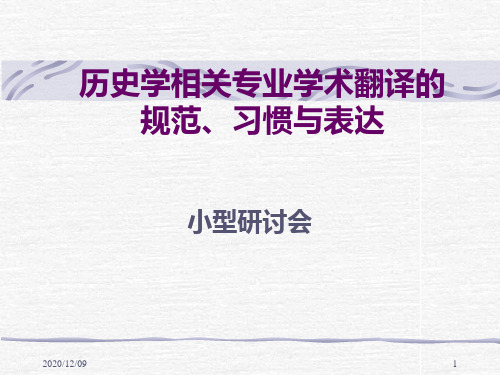
小型研讨会
2020/12/09
1
会议宗旨
为适应研究生教学工作的实际需要,提高学生 驾驭外文学术语言的能力,特别是启发和培养 学生阅读、翻译汉英学术资料的能力,我们特 意筹备举办此次小型研讨会。在陈楠教授的发 起和组织下,我们以“历史学相关专业学术翻 译的规范、习惯与表达”为讨论中心,有针对 性地拟定和征集了若干具体论题,由几位同学 结合各自的研究所长分别发言,同时邀请李鸿 宾教授莅临指导并进行点评。这是我们将专业 外语学习与学术互动交流相结合的首次尝试, 并希望在以后的工作学习中进一步延续、深化 和拓展上述宗旨。
2020/12/09
2
会议要点
论题:历史学相关专业学术翻译的规范、习惯与 表达
主龙、张新宇、张冰冰、卢
亮华、于孟林、尹航 记录人:张新宇、于孟林
2020/12/09
3
PPT精品课件
谢谢观看
Thank You For Watching
4
历史学专业英语08-Political_Philosophy共22页文档
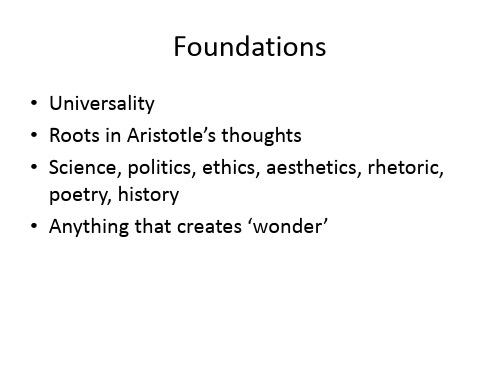
Development
• Arthur Lovejoy (1930s) ‘Unit ideas’ traced through time
• Foundation of ideas • Psychological impact • 1940 – Journal of the History of Ideas
Criticisms
• Not welcomed by traditional historians • Some concerned about the impact of theory • Geoffrey Elton ‘the virus of theory’ • ‘by its very nature, likely to lose contact with
created against this background? • The ‘Zeitgeist’ (spirit of the time)
Key questions
• How does cultural and intellectual change happen?
• Replacement of intellectual frameworks • How do people respond to intellectual
Foundations
• Universality • Roots in Aristotle’s thoughts • Science, politics, ethics, aesthetics, rhetoric,
poetry, history • Anything that creates ‘wonder’
Changes in society
英语专业介绍 PPT课件
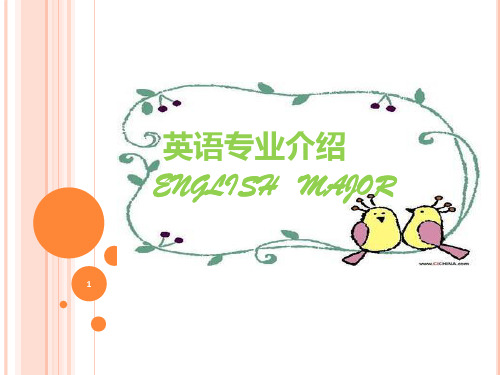
Ⅲ.个人特长:特殊的证书:其他语言类的证书、比 赛证书等等;丰富的经验,尤其是国际版权贸易经验; 特殊技能 ,熟悉Office等办公软件,熟悉商业信函的 写作,具备计算机应用的基础能力;各方面综合能 力 ,有时翻译员不止是翻译的工作,甚至还要做好 翻译员、参事员、协调员、管理员和安全员;掌握与 自己工作有关的最新消息 ,了解和熟悉行业知识、 专业常识、政策方针、存在问题以及相应的外文术语; 幽默感,在英国人看来,幽默感是必须具备的,他们认 为每人都得要有a sense of humor。 ‘He has no sense of humor’是人们可以常常听到的一句话.。
17
外企英语翻译员必须具备的素质
Ⅰ.基本技能 :一个英文翻译员最基本的还是能牢固的把
握和运用自己的专业知识。包括听力理解能力,只有能够听懂
外国人在说些什么才有可能跟他们沟通和交流;表达自己观点
的技能,一个有思想的人必须具备正确表达自己的能力;写作
能力 ;阅读并理解文章的技能;
Ⅱ.提升技能:各种证书尤其是翻译证书,专业八级等证
言学习理论和教育学、心理学。 4.课程研究 善于发现和掌握教育教学规律,善于反思性总
结,增加创新能力。 5.具备英语教学技术能力 重新设计课程,制作课件,开发教学技能,使16
用网络资源和远程教育手段等
外企翻译员
发展方向:
第一方面是考英语专业 或者跨专业考研
另一方面,考国外大学 的研究生,预备在国外 读研究生初步定为国外 留学的目标是欧洲或者 澳大利亚
2. 转行到公关公司记者做几年后,已经练就一手好文采, 这时候,很多记者喜欢自己创业做公关公司,或者跳槽去 公关公司及企业的公关部工作,薪水不菲。
3.常规路线:记者——主任记者——编辑——编辑部主 任——主编——副总编——总编辑记者——广告——广告 部主任——市场总监——副总编辑(经营职位)
历史学专业英语教程

历史学专业英语教程History is a fascinating subject that allows us to explore the past, understand the present, and shape the future. As a history student, it is essential to develop a strong foundation in English language skills to effectively communicate and analyze historical events and concepts. In this English tutorial for history students, we will cover key aspects of academic writing, reading comprehension, and oral communication.1. Academic Writing:Academic writing plays a crucial role in history studies as it enables students to present their research findings and arguments in a clear and organized manner. To excel in academic writing, history students should focus on the following aspects:a. Structure: A well-structured essay or research paper should have an introduction, body paragraphs, and a conclusion. The introduction should provide background information and a clear thesis statement. Body paragraphs should present evidence, analysis, and supporting arguments. The conclusion should summarize the main points and restate the thesis.b. Language: Use formal and concise language to convey your ideas effectively. Avoid colloquial expressions, slang, and jargon. Maintain a consistent tone throughout your writing.c. Referencing: Accurate referencing is crucial in academic writing. Familiarize yourself with the preferred citation style, such as APA or MLA, and ensure that all sources are properly cited. Plagiarism is strictly prohibited in academic writing.2. Reading Comprehension:Reading comprehension is a fundamental skill for history students. It allows you to understand and critically analyze historical texts, primary sources, and scholarly articles. Here are some tips to enhance your reading comprehension skills:a. Preview: Before reading a text, skim through the headings, subheadings, and introductory paragraphs to get an overview of the content. This will help you identify the main ideas and anticipate the author's arguments.b. Active Reading: While reading, actively engage with the text by highlighting important points, taking notes, and asking questions. This will help you retain information and facilitate critical thinking.c. Analyze: After reading, analyze the author's arguments, evidence, and biases. Consider the historical context and evaluate the credibility of the source. Compare different perspectives to develop a well-rounded understanding.3. Oral Communication:Oral communication skills are essential for history students, as they often need to present their research findings, participate in discussions, and engage in debates. Here are some strategies to improve your oral communication skills:a. Preparation: Before a presentation or discussion, thoroughly research the topic and organize your thoughts. Prepare a clear and concise outline to guide your speech.b. Clarity: Speak clearly and articulate your words. Use appropriate vocabulary and avoid excessive jargon. Maintain eye contact with your audience and use gestures to enhance your communication.c. Active Listening: Active listening is crucial in oral communication. Pay attention to others' viewpoints, ask questions, and provide thoughtful responses. Engage in constructive discussions and be open to different perspectives.In conclusion, mastering English language skills is essential for history students to excel in their academic pursuits. By focusing on academic writing, reading comprehension, and oral communication, students can effectively communicate their research findings, analyze historical texts, and actively participate in academic discussions. With consistent practice and dedication, history students can develop astrong foundation in English language skills and enhance their overall academic performance.。
历史学专业英语06-Comparative_History.ppt
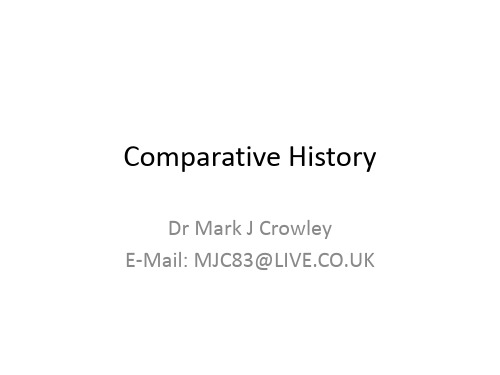
Key questions
• How did similar events produce different results?
• German industrialisation > social problems • Britain > a success • A good way to test theories • Looks at many development possibilities
How has it developed?
• Exchange programmes • Globalisation • Little impact in Britain • To succeed, it needs to be linked with theory
Different types of comparison
Using theory
• Be aware of the restrictions • E.g. labour movements created by
industrialisation (Weber and Marx) • Postmodernism • Postcolonial theory • Development and modernisation important
• Individualising • Universalising • Encompassing comparisons (e.g. nationalism) • Variation-finding (e.g. comparative Fascism) • Complex analysis and detailed understanding • Establish similarities and differences
历史学课程课件通用ppt模板
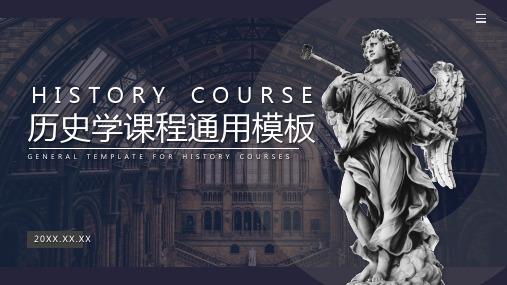
HISTORICAL DOCUMENTS
历史文献
PART 04
04
历史文献
+
=
此处输入具体内容此处输入具体内容此处具体内容此处输入具体内容此处
标题文字添加
此处输入具体内容此处输入具体内容此处具体内容此处输入具体内容此处
标题文字添加
此处输入具体内容此处输入具体内容此处具体内容此处输入具体内容此处
标题文字添加
04
历史文献
标题文字添加
标题文字添加,添加标题文字,修改文字内容,也可以直接复制你的内容到此。
标题文字添加
标题文字添加,添加标题文字,修改文字内容,也可以直接复制你的内容到此。
标题文字添加
标题文字添加,添加标题文字,修改文字内容,也可以直接复制你的内容到此。
标题文字添加
标题文字添加,添加标题文字,修改文字内容,也可以直接复制你的内容到此。
标题文字
单击此处键入文本单击此处键入文本单击此处键入文本单击此处键入文本单击此处键入文本单击此处键入
标题文字
单击此处键入文本单击此处键入文本单击此处键入文本单击此处键入文本单击此处键入文本单击此处键入
INTRODUCTION TO THE HISTORY
史学概论
PART 03
03
史学概论
17%
单击此处键入文本单击此处键入文本单击此处键入文本单击此处键入文本单击此处键入文本单击此处键入
04
历史文献
单击此处键入文本单击此处键入文本单击此处键入文本单击此处键入文本单击此处键入文本单击
标题文字
单击此处键入文本单击此处键入文本单击此处键入文本单击此处键入文本单击此处键入文本单击
标题文字
历史学专业英语
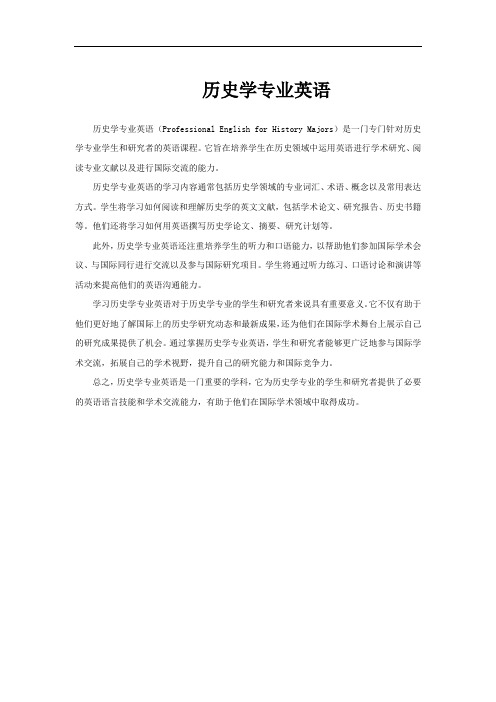
历史学专业英语
历史学专业英语(Professional English for History Majors)是一门专门针对历史学专业学生和研究者的英语课程。
它旨在培养学生在历史领域中运用英语进行学术研究、阅读专业文献以及进行国际交流的能力。
历史学专业英语的学习内容通常包括历史学领域的专业词汇、术语、概念以及常用表达方式。
学生将学习如何阅读和理解历史学的英文文献,包括学术论文、研究报告、历史书籍等。
他们还将学习如何用英语撰写历史学论文、摘要、研究计划等。
此外,历史学专业英语还注重培养学生的听力和口语能力,以帮助他们参加国际学术会议、与国际同行进行交流以及参与国际研究项目。
学生将通过听力练习、口语讨论和演讲等活动来提高他们的英语沟通能力。
学习历史学专业英语对于历史学专业的学生和研究者来说具有重要意义。
它不仅有助于他们更好地了解国际上的历史学研究动态和最新成果,还为他们在国际学术舞台上展示自己的研究成果提供了机会。
通过掌握历史学专业英语,学生和研究者能够更广泛地参与国际学术交流,拓展自己的学术视野,提升自己的研究能力和国际竞争力。
总之,历史学专业英语是一门重要的学科,它为历史学专业的学生和研究者提供了必要的英语语言技能和学术交流能力,有助于他们在国际学术领域中取得成功。
历史英文讲解
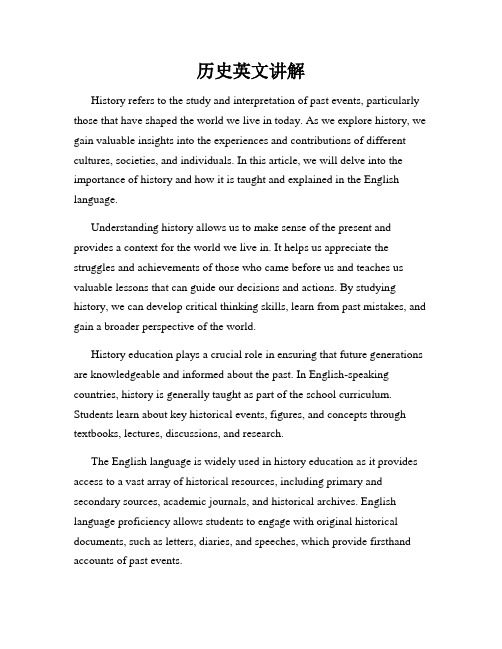
历史英文讲解History refers to the study and interpretation of past events, particularly those that have shaped the world we live in today. As we explore history, we gain valuable insights into the experiences and contributions of different cultures, societies, and individuals. In this article, we will delve into the importance of history and how it is taught and explained in the English language.Understanding history allows us to make sense of the present and provides a context for the world we live in. It helps us appreciate the struggles and achievements of those who came before us and teaches us valuable lessons that can guide our decisions and actions. By studying history, we can develop critical thinking skills, learn from past mistakes, and gain a broader perspective of the world.History education plays a crucial role in ensuring that future generations are knowledgeable and informed about the past. In English-speaking countries, history is generally taught as part of the school curriculum. Students learn about key historical events, figures, and concepts through textbooks, lectures, discussions, and research.The English language is widely used in history education as it provides access to a vast array of historical resources, including primary and secondary sources, academic journals, and historical archives. English language proficiency allows students to engage with original historical documents, such as letters, diaries, and speeches, which provide firsthand accounts of past events.One important aspect of history education is the use of narratives to tell the story of the past. Narratives help students connect with historical events on a personal level and make the subject matter more relatable. English provides a rich vocabulary to describe historical events, analyze causation, and understand the motivations of individuals and societies.Teachers of history in English-speaking countries aim to foster critical thinking skills and encourage students to explore different perspectives and interpretations of historical events. They often use primary sources, historical imagery, and multimedia resources to engage students and make history come alive. By examining different viewpoints, students can develop their analytical and evaluative skills, enabling them to form well-rounded opinions and interpretations of history.In addition to formal education, history is also explained and shared through various mediums, such as books, documentaries, and online platforms. Many historians and scholars communicate historical knowledge to the general public through accessible and engaging language in order to promote a wider understanding of the past. The English language plays a significant role in the dissemination of these historical narratives, enabling a global audience to access and appreciate different historical perspectives.In conclusion, history plays a crucial role in our understanding of the world and the development of critical thinking skills. The English language provides a platform for the exploration and explanation of history, allowing both students and the general public to engage with the past. Through diverse narratives and the analysis of primary sources, we can appreciate theimportance of history in shaping our societies and learn valuable lessons from the experiences of those who have come before us.。
历史学专业英语词汇

Unit 1history ['histri] n. 历史,历史学narrative ['nærətiv] n. 记事,叙事Herodotus [hə'rɔdətəs] n. 希罗多德circa ['sə:kə] prep. (拉丁语)大约(简写c., ca., cir., circ., C.)Thucydides [θju'sidədi:z] n. 修昔底德chronological [.krɔnə'lɔdʒikəl] adj. 年代学的,按年代顺序的territorial [.teri'tɔ:riəl] adj. 区域性的,地方性的thematically [θi'mætikli] adv. 按主题方式,按专题方式Big History 大历史(学派)archaeology [.ɑ:ki'ɔlədʒi] n. 考古学methodology [.meθə'dɔlədʒi] n. 方法论approach [ə'prəutʃ] n. 研究方法discipline ['disiplin] n. 学科perspective [pə'spektiv] n. 观点the humanities [hju:'mænitiz] 人文学科the social sciences 社会科学classification [.klæsifi'keiʃən] n. 分类anthropology [.ænθrə'pɔlədʒi] n. 人类学global history 全球史historiography [.histɔ:ri'ɔgrəfi] n. 历史编纂学,史学史,文献学biographical [.baiə'græfikəl] adj. 传记的,传记体的thematic [θi'mætik] adj. 主题的,专题的medieval [medi'i:vəl] adj. 中世纪的philosophy of history 历史哲学meta-level ['metə 'levəl]总体层面,元级teleological [.teli'ɔlədʒikəl] adj. 目的论的diplomatic [.diplə'mætik] adj. 外交的historical method 史学方法primary sources 原始材料epistemology [i.pisti'mɔlədʒi] n. 认识论Peloponnesian [.peləpə'ni:ʃən] adj. 伯罗奔尼撒半岛的divine [di'vain] adj. 神的,神圣的chronology [krə'nɔlədʒi] n. 编年史cyclical ['saiklikl] adj. 循环的posthumous ['pɔstjuməs] adj. 身后的,死后的dynastic [dai'næstik] adj. 王朝的Saint Augustine [seint ɔ:'gʌstin] n. 圣奥古斯丁Christian ['kristjən] adj. 基督教的,基督教徒的the Renaissance [rə'neisəns] n. 文艺复兴,文艺复兴时期religious [ri'lidʒəs] adj. 宗教的Hegel ['heigl] n. 黑格尔secular ['sekjulə] adj. 世俗的Ranke [ræŋk] n. 兰克epic ['epik] adj. 史诗的,叙事的;史诗,叙事诗nationalistic [.næʃənəl'istik] adj. 民族主义的Fernand Braudel [fer'nan brɔ'del] 费尔南•布罗代尔Le Roy Ladurie [lə rwa ladju'ri:] 拉鲁瓦•拉杜里Marc Bloch [mark blɔk] 马克•布洛克Lucien Febvre [lysjæn fevr] 吕西安•费弗尔multi-disciplinary [.mʌlti'disiplinəri] adj. 多学科的the Annales ['ænəlz] School 年鉴学派quantitative history 数量史学raw data 原始数据ethnic ['eθnik] adj. 族群的,族裔的racial ['reiʃəl] adj. 种族的genre ['ʒɑ:nrə] n. 类型,流派,风格history of everyday life 日常生活史Marxist ['mɑ:ksist] adj., n. 马克思主义(者)的;马克思主义者Eric Hobsbawm ['erik 'hɔbsbɔm] 埃里克•霍布斯鲍姆Georges Lefebvre [ʒɔrʒ lə'fevr] 乔治•勒费弗尔François Furet [fran'swa fy're] 弗朗索瓦•弗雷Roland Mousnier [rɔ'lan mu:'njei] 罗兰•穆尼埃anti-Marxist adj. 反马克思主义的feminist ['feminist] adj. 女性主义的,女权主义的;女权主义者postmodernist [.pəust'mɔdərnist] n., adj. 后现代主义者;后现代主义(者)的Richard Evans ['ritʃəd 'evənz] 理查德•埃文斯Keith Windschuttle [keiθ 'winʃʌtl] 凯斯•温修德historical periodization [piəriədai'zeiʃən] 历史分期classificatory [.klæsifi'keitəri] adj. 类别的,分类上的retrospective [.retrəu'spektiv] adj. 事后回想的,回顾的the Gilded Age 镀金时代the Dark Age(s) 黑暗时代the First World War 第一次世界大战decimal ['desiməl] adj. 十进法的,以十为基础的talismanic [.tæliz'mænik] adj. 护符(般)的,有护符般效力的the Victorian [vik'tɔ:riən] Era 维多利亚时代the Napoleonic [nə.pəuli'ɔnik] Era 拿破仑时代the Meiji ['mei'dʒi:] Era 明治时代the Merovingian [.mærə'vindʒiən] Period 墨洛温王朝时期Romantic [rə'mæntik] period 浪漫主义时期the sexual ['seksjuəl] revolution 性革命conservative [kən'sə:vətiv] adj. 保守的Roman Catholic ['kæθəlik] culture 罗马天主教文化Franco ['frɔŋkəu] n. 弗朗哥Unit 2primitive culture 原始文化Paul Tournal [pɔl turnal] 保罗·杜纳尔anté-historique ['a:ŋtei 'istɔrik] n.(法语)史前的prehistoric ['pri:his'tɔrik] n. 史前的Daniel Wilson ['dænjəl 'wilsn] 丹尼尔·威尔逊prehistorian [pri:hi'stɔ:riən] n. 从事史前史研究的专家,史前史学家the Stone Age 石器时代the Bronze Age 青铜器时代the Iron Age 铁器时代excavation [.ekskə'veiʃən] n. 发掘geologic [dʒiə'lɔdʒik] adj. 地质学的geographic [dʒiə'græfik] adj. 地理学的literate ['litərit] adj. 识字的,有文化的geneticist [dʒi'netisist] n. 遗传学家linguist ['liŋgwist] n. 语言学家paleontology [.pæliɔn'tɔlədʒi] n. 古生物学biology [bai'ɔlədʒi] n. 生物学geology [dʒi'ɔlədʒi] n. 地质学archaeoastronomy [.ɑ:kiəuəs'trɔnəmi] n. 考古天文学linguistics [liŋ'gwistiks] n. 语言学molecular [mə'lekjulə] adj. 分子的genetics [dʒi'netiks] n. 遗传学archaeological [.a:kiə'lɔdʒikəl] adj. 考古的,考古学上的artifact ['ɑ:tifækt] n. 人工制品anonymous [ə'nɔniməs] adj. 无名无姓的,匿名的Neanderthal [ni'ændətɑ:l] n. 尼安德特人academic [.ækə'demik] adj. 学术上的,从事学术研究的New Guinea [nju: 'gini] n. 新几内亚Paleolithic [.pæliəu'liθik] n. 旧石器时代;adj. 旧石器时代的the Lower Paleolithic 旧石器时代早期Homo sapiens ['həuməu 'seipienz] n. 智人(现代人的学名)Homo habilis ['həuməu 'hæbilis] n. 能人species ['spi:ʃi:z] n. 种类,物种usher ['ʌʃə] vi. 引入,引导anatomic [.ænə'tɔmik] adj. 解剖学上的burial ['beriəl] n. 埋葬,葬礼,坟墓sophisticated [sə'fisti.keitid] adj. 复杂的,精密的,老练的highlight ['hailait] n. 精彩部分,闪光点the Middle Paleolithic 旧石器时代中期the Cro-Magnon ['krəʊ'mænjɔŋ] n. 克罗马尼翁人nomadic [nəu'mædik] adj. 游牧的,游牧民族的,流浪的hunter-gatherer n. 捕猎采集者egalitarian [i.gæli'tɛəriən] adj. 平等主义的sedentary ['sedən.təri] adj. 定居的,固定不动的chiefdom ['tʃi:fdəm] n. 首领的地位,首领的权威stratification [.strætifi'keiʃən] n. 分层indigenous [in'didʒinəs] adj. 土著的,土生土长的,本地的the Upper Paleolithic 旧石器时代晚期Mesolithic [.mesə'liθik] n. 中石器时代;adj. 中石器时代的the Middle Stone Age 中石器时代Neolithic [.ni:əu'liθik] n. 新石器时代;adj. 新石器时代的Pleistocene ['plaistəusi:n] n. 更新世;adj. 更新世的millennia [mi'leniə] (millenniums) n. 数千年marshland ['mɑ:ʃlænd] n. 沼泽地midden ['midn] n. 贝冢deforestation [.di:fɔris'teiʃən] n. 森林开发,滥发森林composite ['kɔmpəzit] adj. 合成的,复合的flint [flint] n. 极硬的东西,打火石microlith ['maikrəliθ] n. 细石器microburin [.maikrə'bjuərin] n. 小雕刻刀tackle ['tækəl] n. 用具,滑车adze, adz [ædz] n. 锛子canoe [kə'nu:] n. 独木舟bow [bəu] n. 弓the New Stone Age 新石器时代domestication [də.mesti'keiʃən] n. 驯养,驯化warfare ['wɔ:fɛə] n. 战争,战事Stonehenge ['stəun'hendʒ] n. 巨石阵millennium [mi'leniəm] n. 一千年Sumerians [su:'miriəns] n. 苏美尔人Peru [pə'ru:] n. 秘鲁Mesoamerica [.mezəuə'merikə] n. 中美洲the Fertile Crescent ['kresənt] n. 新月沃地(西亚伊拉克两河流域连接叙利亚一带地中海东岸的一片弧形地区,为上古文明发源地之一)irrigation [.iri'geiʃən] n. 灌溉the Metal Age 金属时代Chalcolithic [.kælkə'liθik] n. 铜石并用时代;adj. 铜石并用时代的the Old World 旧大陆,东半球(尤指欧洲)metallurgy [me'tælədʒi] n. 冶金术,冶金学metalworking ['metəl.wə:kiŋ] n. 金属加工tin [tin] n. 锡outcropping ['autkrɔpiŋ] n. 露出,露出地表arsenic ['ɑ:sənik] n. 砷,砒霜ferrous ['ferəs] adj. 含铁的cradle ['kreidəl] n. 摇篮,发源地valley ['væli] n. 流域Euphrates [ju:'freiti:z] n. 幼发拉底河Tigris ['taigris] n. 底格里斯河Mesopotamia [.mesəpə'teimiə] n. 两河流域Nile [nail] n. 尼罗河Indus ['indəs] n. 印度河subcontinent [sʌb'kɔntinənt] n. 次大陆adjacent [ə'dʒeisənt] adj. 临近的implement ['implimənt] n. 工具,器具ornament ['ɔ:nəmənt] n. 装饰物,装饰。
- 1、下载文档前请自行甄别文档内容的完整性,平台不提供额外的编辑、内容补充、找答案等附加服务。
- 2、"仅部分预览"的文档,不可在线预览部分如存在完整性等问题,可反馈申请退款(可完整预览的文档不适用该条件!)。
- 3、如文档侵犯您的权益,请联系客服反馈,我们会尽快为您处理(人工客服工作时间:9:00-18:30)。
What is political history?
• "political history as a whole cannot exist without the study of ideological differences and their implications” – Joanne B Freeman
• Politics understood through a historical framework
Methodology
• Disagree about subject matter • ‘true politics’ • Agent of change? • Should policy and politics be combined?
20th century
• The supremacy of governments now questioned
• World War One highlighted the ineffectiveness of institutions
• Herbert Butterfield, The Whig Interpretation of History (1931)
Political History
Dr Mark J Crowley E-Mail: MJC83@
Announcement
• No class on 18 April • Next class is on 19 April, 1900-20.30 • No women’s history class today • Next women’s history classes 19 April, 08.00-
The development of political history
• Sir John Seeley “history is past politics, and politics present history” (The Growth of British Policy, 1895)
• History following a linear course?
09.30 and 26 April, 08.00-09.30 in teaching building 5
What is political history?
• “is an idea of the state with a moral and spiritual force beyond the material interests of its subjects: it followed that the state was the main agent of historical change” - Hegel
• Individuals, not institutions were now important
20th century
• Lewis Namier, Structure of Politics at the Accession of George III (1929)
• Move away from the ‘Great men’ theory • Individuals are important • Collective biography • Psychological, personal and material factors • What influenced people?
High politics
• Principles are not important • Motivated by belief • Ideas are important • Politicians ‘play to win’
High politics – newer approaches
• Local factors • Individual behaviour within a group • Thought and political action • Emphasis on ‘situation’ • Look at history of ideas or popular politics
19th century British political history
• Influenced by the Liberal (Whig) government • Believed the government improved political
institutions • Claimed responsibility for reforms • Thomas Macaulay ‘History of England’
Influence of ‘ideas’
• J G A Pockock • Quentin Skinner • J W Burrow • analysis of speeches • Placing ideas in the contemporary social
context • Situational necessities
What does it look at
• Single nation • Political development
Challenges
• Social history • Women’s history • Feminist history
New political histories
• New post-Marxist challenge • Challenged reductionist analyses betweenΒιβλιοθήκη High politics
• “the politicians that mattered” – Maurice Cowling, The Impact of Labour (1974)
• ‘situational necessity’ • Rivalry in a small political elite • ‘game theory’
